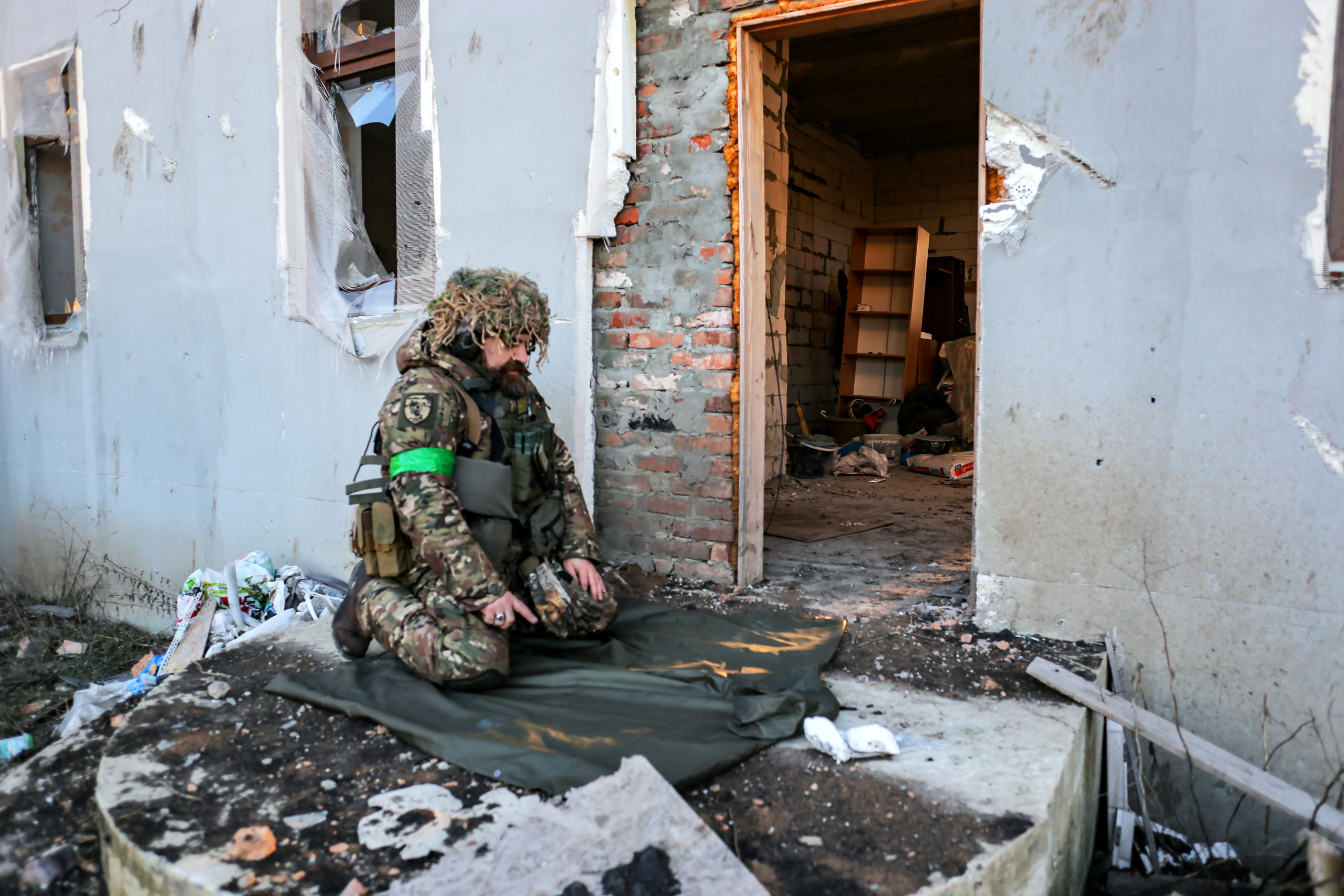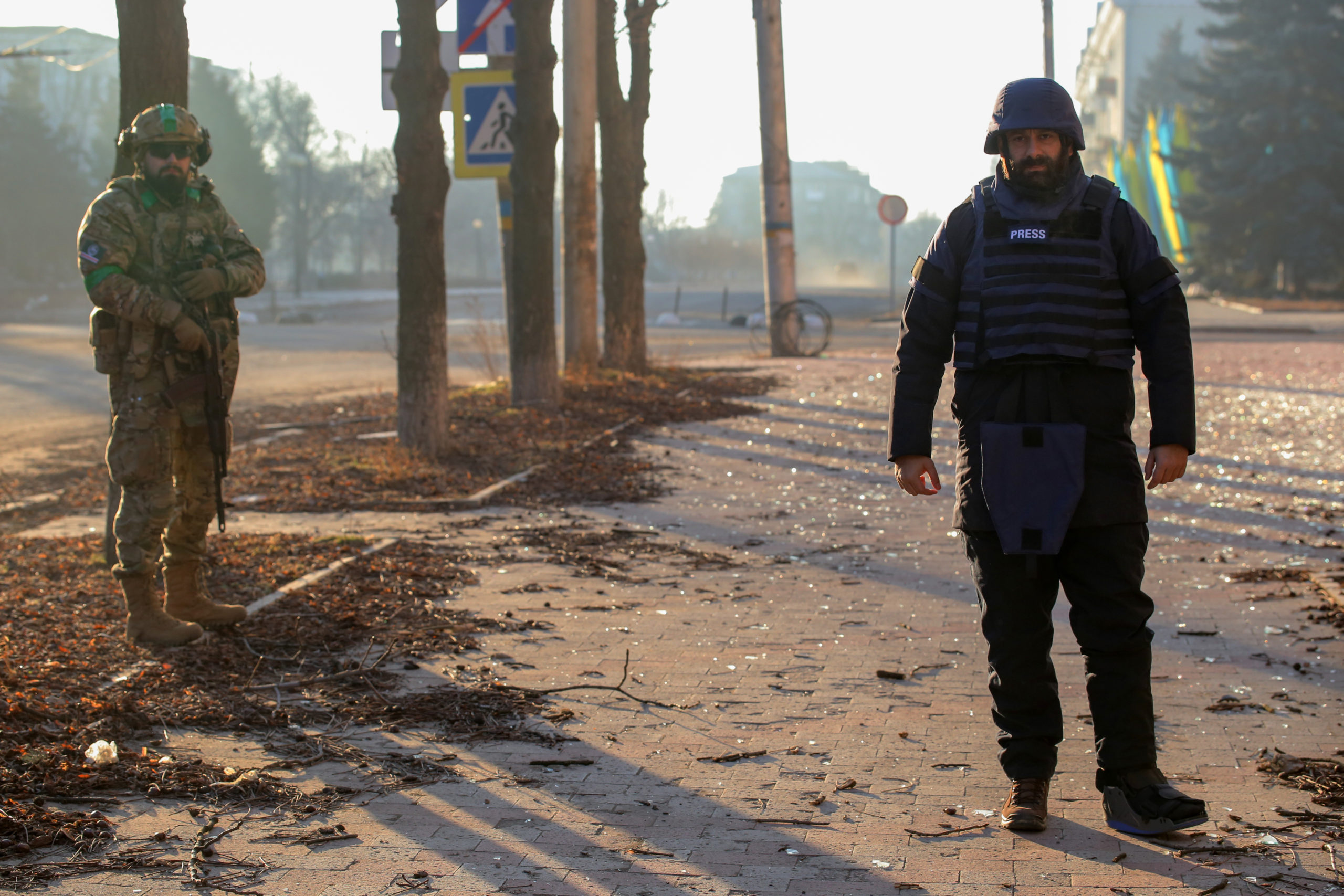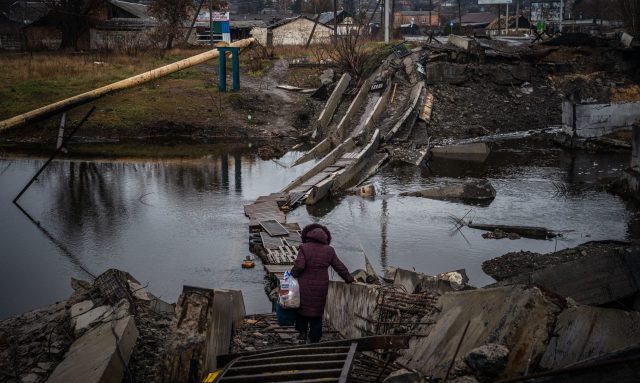A civilian in Bakhmut last month (DIMITAR DILKOFF/AFP via Getty Images)

“The objective for today is to come back alive.” Yevgeny is a young commando from the “Mad Pack”, a special forces unit that has been fighting in Bakhmut since November. His words are familiar — lacquered with that mix of emotions common to almost all soldiers fighting on the frontlines of war: laughter and unease. We clamber into a Land Cruiser and head toward the city. “The situation is always changing,” he continues. “But one thing remains the same: the line of contact is always active.”
Even by the standards of eastern Ukraine, Bakhmut is a hellscape of destruction. Electricity has been out since August and water since October. Rows of uniform Soviet-style buildings now resemble a series of ragged molars, mottled by shells and blackened with soot.
The streets of this city that once had a population of 70,000 are almost empty of civilians, save for the odd elderly man or woman who ambles past amid the constant drum of nearby shelling. Everywhere I look I see soldiers: standing guard, advancing forwards, taking cover, congregating in doorways and behind walls, and almost always smoking. Our first port of call is a mosque. A small squat rectangular box that could be a normal house save for a small golden dome on its roof. Kazbek, a Chechen soldier fighting for Ukraine, who is our guide with Yevgeny, gets out of the car and goes to pray, bowing to Mecca as shells explode around us.

If you want to discover the madness of Russia’s invasion of Ukraine, come to Bakhmut. The battle for the city is now the longest of the war. Russia launched a large offensive to try to take it in July 2022 after it took Severodonetsk, the final major city of the Luhansk region. The truth is Russian troops are dying in their thousands here — and possibly for nothing. The UK Ministry of Defence has outlined Bakhmut’s “limited operational value”: the city’s fall would be useful, but by no means decisive, in helping Russia press further through the Donbas. The fight, therefore, has become almost symbolic. “Bakhmut holds” is now a rallying cry for Ukrainians.
We advance further into the city. I see my first civilian vehicle: a minibus covered in grime, onto which someone has painted a white cross. Then we see an old man walking on the pavement. Yevgeny asks why he hasn’t left. “Where would I go?” he responds. He tells me that he lives with some friends in the city and has a stove and a basement to hide in. We turn a corner, and the Land Cruiser skids across the wet and pitted road. “The full contact front is just there,” says Yevgeny, pointing. Kazbek explains what this means: “The Russians are just 200 metres down that road. Tomorrow, I will come back and kill them.”
Shelling is a constant refrain in Bakhmut. But this close it’s different. Shells whistle around me, deep throaty roars that crescendo to a colossal bang as they strike home. “Now the Russians are attacking Ukrainian positions from three sides,” says Kazbek by way of explanation. We climb back into the Land Cruiser and drive into what appears to be a fenced-off wasteland right by the line of contact. On a wall some graffiti reads, “the republic of Ichkeria [Chechnya] will be free. Russians will be dead.” A lone cyclist comes into view. “Stupid,” says Yevgeny.
We drive out into what is left of the main road, until we stop by the city’s monument of a MIG 17 fighter jet. “This used to be a famous Instagram spot,” says my photographer Nata. I recently sprained my ankle so I am hobbling slightly, though my support boot means I can walk almost normally. I pose by the plane, resting gingerly on my foot. Kazbek laughs. I remember his words when we met: “I’ve never seen anyone come to the front with a crutch before.
Eventually, Kazbek decides it’s time to return to base. “There are,” he excitedly explains, “two roads to get out. The one that is constantly shelled much more interesting, so let’s take that!” Nata looks less than impressed. As we drive down the road, I see holes carved out by shells and burned-out vehicles. War zones can assume many shapes: sometimes they’re cratered and grey like the surface of the moon; other times they are just a mesh of urban destruction. Bakhmut resembles the bottom of the ocean, the tangled vehicles like metal crustaceans hugging the seabed, silent witnesses to it all.
***
The Mad Pack live in a base swaddled in concrete where they spend most of their lives underground to avoid the shelling. It’s a no-frills affair. My bed is a door laid on the concrete floor with a sleeping bag on it, while Nata sleeps on a plastic waterbed to my right. We are divided by a anti-tank Javelin case. In the corner of the room stands one of the many NLAWs that Britain has delivered to Ukraine. “God bless the United Kingdom; God bless Boris Johnson!” says Kazbek to me as we pose with one.
The night before we entered Bakhmut, I met “Ivan”, the unit’s commander, whose call sign is Coyote. We were in an underground room amid piles of cardboard boxes, a mound of firewood, a wooden stove of the kind you see everywhere on the front in Ukraine and, the focal point of the room, a chess set that the soldiers take turns to use. Coyote is 34 and has been fighting since the war began in 2014. His unit is Special Forces, he says. He can’t give me details about their operations, but he has two units on rotation. His main tasks are planning and special ops — taking the fight to the enemy.
Bakhmut is important to Russia because of Putin’s “populist needs”, he says. “Since February 24, the Russians have had few victories and many defeats. They need this victory; the city is close to the border and to their logistics. They cannot attack Kherson [in the south] because of the river, and in other territories on the front lines they have supply problems. Bakhmut is the only spot where theoretically they can win. But if we were to lose Bakhmut, then speaking without emotion, it would not be a strategic defeat, we’d just lose a town. But in the meantime, we tie up a large force of Russians so they cannot proceed in other areas. We buy time for other Ukrainian forces.”
The situation is difficult, he admits, but controlled. The Ukrainians have suffered significant losses, as have the enemy. “They are going building-by-building. They are trying to encircle us; they keep trying again and again.”

The Russian tactics are based on what I hear described as “meat waves” of soldiers, usually conscripts or prisoners fighting for the Wagner mercenary group who are promised a pardon in the unlikely event they survive more than six months here. The Ukrainians often wipe them out. But more always come. It’s the downside of fighting an enemy with a population three times the size and little regard for the lives of its citizens. “The waves can unnerve the new guys,” says Coyote. “They destroy the first one and then more keep coming; they start to think it will never end. The experienced guys just swap their rifle for a machine gun and it’s all good!”
But the fight is tough. Russian forces have now secured northern access to the city and also recently made a breakthrough on the south towards the centre. They have surrounded the town and have fire control of the only road out. Coyote, though, remains bullish. From November to the beginning of January, the Ukrainians lost about 10 positions; since then, they have lost only four. “The artillery and drones are working,” he says. I ask him about their use of drones, the biggest change in the war since I was here last in the spring. Coyote smiles, gets up and returns, grinning even more, with a small blue object — a six-inch rocket with three fins topped with a golden dome. “We make it on a 3D printer. It costs about $30,” he tells me with pride. “We fill it with explosives, and then put it in one of our drones… and drop.”
One of the other officers, who gave his name as his call sign “Barman”, explains their importance. “A while ago we used big, expensive tactical drones, made especially for the military,” he tells me. “But now, small and medium-sized civilian drones are becoming separate military units because they can cause great damage to the enemy.”
He continues. “It used to take months, sometimes years, to train people to go into enemy territory and send in the coordinates for the artillery to fire. Now, one civilian drone can do it. It saves lives and even if it gets destroyed you can buy a new one cheaply. We have learned how to attach small grenades and bombs to them. Now we can send up a small $3,000 Mavik 3 with a grenade — and if you drop it perfectly on a T-90 you can take out a tank that costs millions.” His words bring home a truth that has gradually dawned on me over the past few years. Talk of future war tends to be dominated by AI and visions of marauding robot soldiers, but what I see here is something different: the weaponisation of the quotidian. Cheap drones you can buy online, and plastic projectiles you can knock out on a printer in your living room, are now affecting the balance of power in conflict.
Coyote gives me his final assessment. “I think the battle will continue for about one or two months unless there is a major encirclement or something unexpected happens — it will go street by street; the artillery will slowly destroy all the tall buildings and it will [descend to] urban warfare. It will crawl to an end.” As we finish, I ask him what he would say to Putin if he were here now. “One second,” he says and gets up. He returns with a pistol and pulls the trigger. Its click reverberates around the room. “I’d say nothing — just kill him.”
Later, Coyote is in a playful mood. “What we sometimes also do,” he tells me, “is drop dildos from the drones, just to show them the contempt we have for them. Also, it’s a taste of what’s coming to them — how we’re going to fuck them.” I ask what happens if they hit a Russian soldier on the head. Everyone laughs. Coyote, still looking mischievous, describes how they sometimes find lists of “heroic deaths” written on the walls of Russian positions they capture. “You know, they have a photo of the guy and under it ‘Vlad was killed by a Bayraktar’ and so on…. Imagine: ‘Here lies Sergei — he was killed by a massive cock.’”
***
Dinner is served. In a bucket on the floor, Kazbek washes his hands, observing Muslim custom. In the kitchen, an older man carrying a large knife, which is definitely not designed for cooking, hands me a bowl of soup. Our meal is laid out on a long table: eggs, tomato with grated cheese, cold chicken, pancake rolls, sausages, several plates of bread, a potato salad, egg with garlic, another plate of cold meats, and a plate of sliced lemon. All this comes from Ukrainian volunteers, adds Kazbek.
Yevgeny interrupts the meal to show us his war wounds. He gets out his phone and opens Instagram. A photo shows him with two pieces of shrapnel, one each in his head and leg. He explains how he posted the image and then blocked all his relatives from seeing it. “It happened on the first day of the war — 24 February! You know the funniest thing? That’s also my birthday. From now on… it’s two birthdays for me!”
Dinner ends and the soldiers leave to wind down. Me and Nata are left. She’s been discussing the cultural aspect of the war with Yevgeny and Kazbek because it’s a war not just against Ukrainian territory but against its very essence as a nation. Putin says there is no such thing as Ukraine, which means everything from its language to its history and literature must be denied. “For years we were told Ukrainian was just for peasants and Russian was for the sophisticated,” she says. “I see Russians and they can barely speak it. I can live without Dostoevsky. Look at Crime and Punishment, Raskolnikoff kills an old woman for money and then spends the entire book trying to work out why he did it. I’ll tell you why he did it: because he’s trash.”
After dinner, we sit in the communal area. I look around at these men, some of whom have been fighting for almost a decade. They are tired but undiminished: this fight is existential for them. Tendrils of cigarette smoke curl towards the ceiling. The soft shuffle of moving chess pieces is almost finished. Kazbek has composed a song about Bakhmut. Yevgeny gets out a guitar and starts to sing.
Bakhmut, Bakhmut you are so proud and so brave
you left your mark on fate.
Bakhmut Bakhmut, the enemy has come leaving ruin
But we are all waiting…
for a new dawn in Ukraine.










Join the discussion
Join like minded readers that support our journalism by becoming a paid subscriber
To join the discussion in the comments, become a paid subscriber.
Join like minded readers that support our journalism, read unlimited articles and enjoy other subscriber-only benefits.
Subscribe